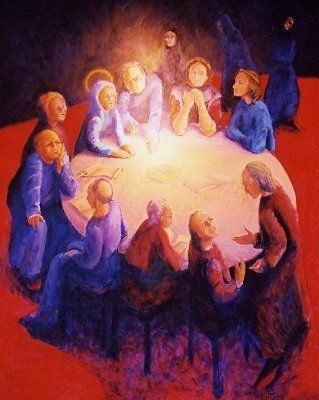Anglo-Saxon Thorney
Expansion of the Rhineland tribes pressured peoples from Lower Saxony to raid then settle in England.
Just as the Romans invaded and colonised Britain from 44BC, the peoples from Saxony in Northern Germany invaded from the fourth Century to displace Roman and Celtic cultures. Coastal communities like Thorney Island were to bear the brunt of these first attacks to loot, though quickly establishing a farming culture that establishes a continuous story we can trace today. Saxons were initially Pagan. The days of the week we have today being based on their pagan gods (Woden, Thor & Freia), while months bear Roman names (Janus, Mars, Julius, Augustus) and numbers (Septus-7, Octo-8, Novo-9 & Deci-10). Old clocks & sundials have Roman numerals, while modern clocks & digital time-ware use Arabic numerals. Our Time is truly multi-cultural.
Roman Britain had begun a Christian journey through St Alban (250AD’ish) and the whole Roman Empire thro’ Emperor Constantine in 312AD. It took St Wilfred to finally convert Sussex King Ethelwelch in 681AD, who then gave land to establish churches. There is a story that St Wilfred intervened with Ethelwelch’s queen to mediate her fervent faith that had deprived her husband of his conjugal rights. Her taking of the veil and fleeing to Ely to be a nun perhaps offered Ethelwelch the chance to marry again to secure his line, perhaps explaining why he was so grateful to St Wilfred?Thorney Island can trace its time as a Priory established in 683 when St Wilfred was made Bishop of Selsey (also at York). East Thorney existed as a village to the East of Selsey, explaining ‘West’ Thorney on Thorney Island. East Thorney was a casualty of sea level rise and is now submerged offshore. St Wilfred is credited with moving British Christianity from Celtic to a Roman style at the Synod of Witby.
On the front line of Saxon harbour settlements from 750AD, Thorney Island would have had a share of the misery of raids until King Alfred became Great in the 880’s and fully established his navy.
The story of Viking conversion to Christianity was a bloody affair: St Edmund pictured below falling victim to the Viking terror campaign in East Anglia. The Vikings ravaged Saxon England until their first real defeat when they met the Saxon army of Wessex in 871, led by Aethelred and his younger brother Alfred. Succeeding as King the year later, Alfred was reduced to fighting a guerrilla campaign before a decisive victory at Edington in 878 and some astonishing diplomatic victories that culminated in the establishment of a kind of peace through the Danelaw and the baptism of the Viking king, Guthrum in 886. Alfred went on to establish his Navy and a series of burghs as strong defensive settlements that established English counties. It’s easy to imagine the Saxon boats working out of the inlets of the harbour, crewed by Thorney men. Read Alfred’s astonishing story here:
Under the peace that Alfred established, a priory on Thorney Island grew rich enough to support 12 monks. By the time of the Doomsday Book (1087AD) a monk called Magyar held tenure of the Island.
Caedmon, our Saxon Poet ?
Caedmon is known as a Saxon poet and is reputed to have been born on Thorney Island. Supposedly waterman serving St Wilfred as a ferryman at Selsy, he is also known as ferryman to the Abbey of St Hilda at Witby (Yorkshire). Caedmon reputedly produced the first Saxon verse after a vision commanding him to ‘sing the creation’, so pictured with animals. There is also a Thornei Island in the Thames, so there are others than may lay claim to him.
Caedmon’s Hymn in Old English and its modern translation
‘Nu sculon herigean heofonrices Weard,
Meotodes meahte ond his modgeþanc,
weorc Wuldorfæder; swa he wundra gehwæs
ece Drihten, or onstealde.
He ærest sceop eorðan bearnum
heofon to hrofe, halig Scyppend:
þa middangeard moncynnes Weard,
ece Drihten, æfter teode
firum foldan, Frea ælmihtig.’
Translates as:
Praise now to the keeper of the kingdom of heaven,
the power of the Creator, the profound mind
of the glorious Father, who fashioned the beginning of every wonder, the eternal Lord.
For the children of men he made first
heaven as a roof, the holy Creator.
Then the Lord of mankind, the everlasting Shepherd,
ordained in the midst as a dwelling place,
Almighty Lord, the earth for men.
(excerpt from The Earliest English Poems, Third Edition, Penguin Books, 1991):








